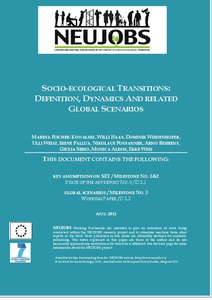Socio-ecological transitions: definition, dynamics and related global scenarios
"This report tackles three issues. It outlines an intellectual framework for understanding socio-ecological transitions as transitions between different societal energy regimes and co-dependent ecological changes. It is shown that while Europe has completed its historical transition into the fo...
| Main Authors: | , , , , , , , , , |
|---|---|
| Institution: | ETUI-European Trade Union Institute |
| Format: | TEXT |
| Language: | English |
| Published: |
Brussels
2012
CEPS |
| Subjects: | |
| Online Access: | https://www.labourline.org/KENTIKA-19134439124919526119-Socio-ecological-transitions-d.htm |
| Summary: | "This report tackles three issues. It outlines an intellectual framework for understanding socio-ecological transitions as transitions between different societal energy regimes and co-dependent ecological changes. It is shown that while Europe has completed its historical transition into the fossil fuel based industrial regime and has reached an energetic and material stabilization phase (at high levels), its new transition, away from fossil fuels, while inevitable in the long run, has just barely begun. At the same time, globally, a number of very large societies right now undergo the historical transition, the transition into a fossil fuel energy regime. This creates a very complex situation for Europe's new transition. Secondly, the report analyses, in a radical approach transcending the green jobs concept, in which way the historical? transition has fundamentally transformed human labour, and what can be learned from this, and from changed framework conditions, for labour in the new socio-ecological transition. Thirdly, it screens a large array of literature (extensively documented in the appendices to the report) to extract well grounded and so far possible quantitative assumptions about how global framework conditions are evolving, up to 2025 and later. It characterizes six global megatrends, three originating from natural, and three originating from societal drivers, that will impact upon Europe, either in a more friendly or more tough fashion. Finally, the report sketches possible policy strategies in which way Europe might interpret and pursue the new socio-ecological transition; it distinguishes between no policy change, ecological modernization? and sustainability transformation?. This marks the starting point for a further more detailed analysis by other working groups of the project NEUJOBS, as well as scenario and modelling efforts of the future of human labour in Europe." |
|---|---|
| Physical Description: | 304 p. Digital |

